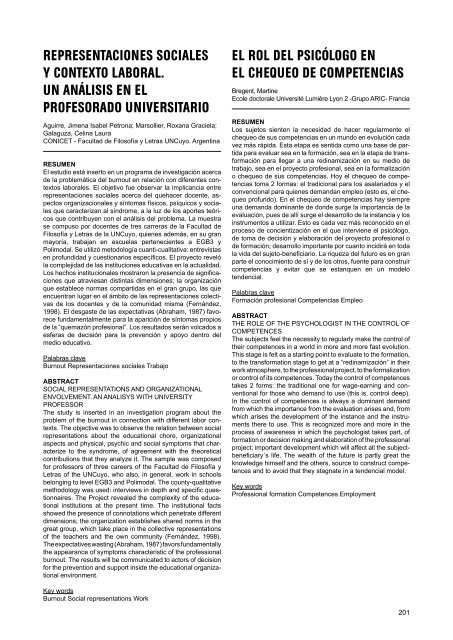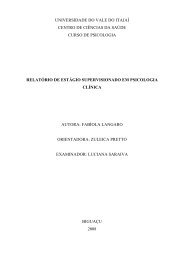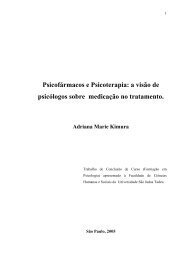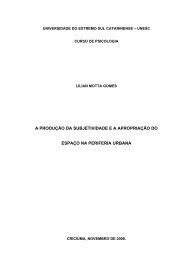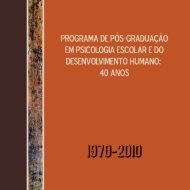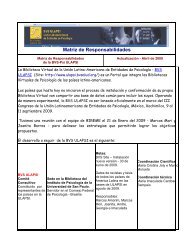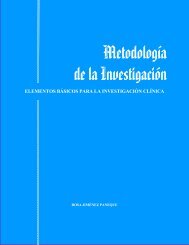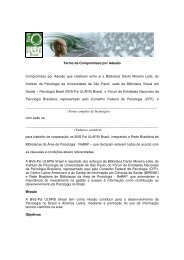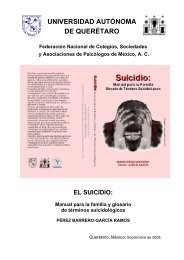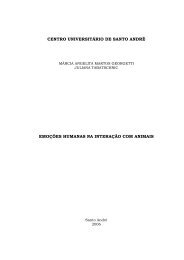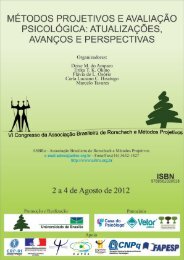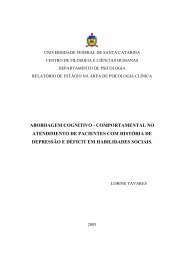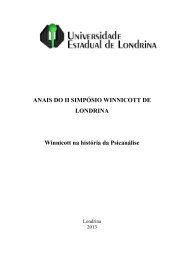- Page 1:
ISSN 1667-6750Universidad de Buenos
- Page 5:
índice de áreasTOMO IPsicología
- Page 8 and 9:
LA DESATENCIÓN Y LA HIPERACTIVIDAD
- Page 10 and 11:
DE LA MOTIVACIÓN A LA IMPLICACIÓN
- Page 12 and 13:
CORRECCIONES A EXÁMENES ESCRITOS E
- Page 14 and 15:
MEDIAR LOS MEDIOS EN LA ESCUELA. AL
- Page 16 and 17:
PERFILES DE LECTURA Y ESCRITURA EN
- Page 18 and 19:
FILOSOFÍA Y EPISTEMOLOGÍATRABAJOS
- Page 22 and 23:
yugo de una economía de mercado y
- Page 24 and 25:
PERFECCIONISMO ADAPTATIVO Y DESADAP
- Page 26 and 27:
LA OBSERVACIÓN, HERRAMIENTAEN LA F
- Page 28 and 29:
estuve volando, no escribas esto qu
- Page 30 and 31:
contexto sin entretejerse con su mu
- Page 32 and 33:
cuentran diversas barreras. Cada ve
- Page 34 and 35:
PROCESO PSICOTERAPÉUTICO:ESTUDIO D
- Page 36 and 37:
su padre.Al inicio Susana manifiest
- Page 38 and 39:
mayores, en el otro la mujer y en e
- Page 40 and 41:
RESULTADOS PRELIMINARES DEL PROYECT
- Page 42 and 43:
PERFIL PSICOPATOLÓGICO DEUNA POBLA
- Page 44 and 45:
personalidad. Barcelona: Paidós.BE
- Page 46 and 47:
de terror, el brazo le temblaba y l
- Page 48 and 49:
NO SOY YO, ES ELLA. EL MOTIVO DE CO
- Page 50 and 51:
padres. Al respecto encontramos que
- Page 52 and 53:
esta forma, la selección natural n
- Page 54 and 55:
LA SEXUALIDAD FEMENINAA PARTIR DEL
- Page 56 and 57:
adical en lo atinente a la conceptu
- Page 58 and 59:
METODOLOGÍANos hemos propuesto tra
- Page 60 and 61:
versas, las FMP en riesgo social te
- Page 62 and 63:
EN TORNO A LA PLENITUD SEXUAL: BÚS
- Page 64 and 65:
DOUGLAS, M. 1998. Estilos de Pensar
- Page 66 and 67:
A veces, lo que predomina es la dif
- Page 68 and 69:
EL ENFOQUE CIENTíFICOEN LA PSICOTE
- Page 70 and 71:
TERAPIA COGNITIVA Y YOGA. LA INCLUS
- Page 72 and 73:
IMPACTO DE LAS CATEGORíAS CULTURAL
- Page 74 and 75:
(DSM-IV) en contextos intercultural
- Page 76 and 77:
psicoterapia psicoanalítica de gru
- Page 78 and 79:
AUTOLESIONES DELIBERADAS -DSH-,UNA
- Page 80 and 81:
POSIBLES SALIDAS DE LA SIMBIOSISMen
- Page 82 and 83:
Bill: Estoy en el Japón, en el cam
- Page 84 and 85:
por información general (lugar de
- Page 86 and 87:
algo o desentenderse de ello es asu
- Page 88 and 89:
CLíNICA DIFERENCIAL DE LAS PERTURB
- Page 90 and 91:
cobra importancia en las discusione
- Page 92 and 93:
TRASTORNOS DEL LENGUAJE EN EL ESPEC
- Page 94 and 95:
cumple, en el hombre, la función d
- Page 96 and 97:
psíquica, históricamente constitu
- Page 98 and 99:
LA DEPRESIÓN DESDELA PSICOLOGÍA E
- Page 100 and 101:
BIBLIOGRAFÍAALLOY, L.; ABRAMSON, L
- Page 102 and 103:
PRESENTACIÓN DEL DISPOSITIVO PSICO
- Page 104 and 105:
MANIFESTACIONES DE LA VIOLENCIAEN A
- Page 106 and 107:
específicos y eficaces de interven
- Page 108 and 109:
eside en el conjunto de caracterís
- Page 110 and 111:
TRASTORNOS ALIMENTARIOS EN ESTUDIAN
- Page 112 and 113:
con aquellos que no presentan riesg
- Page 114 and 115:
situación que aún llena de orgull
- Page 116 and 117:
LO DELUSIONAL OEL SIMBOLISMO DESARR
- Page 118 and 119:
en uno, sin sentir que la sombra de
- Page 120 and 121:
otro de la escena que no avanza sob
- Page 122 and 123:
EVALUACIÓN DE DIFERENCIAS EN LOS R
- Page 124 and 125:
Lugar. Incluye Protocolo de Logro d
- Page 126 and 127:
comunicación no verbal de las nece
- Page 128 and 129:
emoción-abstracción al enfoque cl
- Page 130 and 131:
PERFIL DE LOS RESIDENTES EN SALUD M
- Page 132 and 133:
Organización Mundial de la Salud (
- Page 134 and 135:
de preguntas se refiere a “trasto
- Page 136 and 137:
PERFIL COGNITIVO DE PACIENTES CON T
- Page 138 and 139:
posee una excelente validez y confi
- Page 140 and 141:
historia de mis maduraciones y regr
- Page 142 and 143:
APLICACIÓN DE UN MODELO DE RESOLUC
- Page 144 and 145:
LA ALIANZA TERAPÉUTICA Y SU INTERA
- Page 146 and 147:
Líneas potenciales de investigaci
- Page 149 and 150: HACIA UNA HERMENÉUTICA DELCASO BIL
- Page 151: posters
- Page 155: Psicología del Trabajo
- Page 158 and 159: ecibidos de las carreras de Psicolo
- Page 160 and 161: GESTIÓN DEL CAMBIO EMPRESARIAL Y L
- Page 162 and 163: cambio debe ser traducida y deconst
- Page 164 and 165: dad, se observa que los hombres obt
- Page 166 and 167: TRABAJO PRECARIOMosso, Elba; Carri,
- Page 168 and 169: investigaciones dan cuenta que la m
- Page 170 and 171: condiciones previstas en los artíc
- Page 172 and 173: nación por Embarazo de 1978, y la
- Page 174 and 175: INSTITUCIONES DEL ESTADO:TRANSFORMA
- Page 176 and 177: esultados, y finalmente, el siempre
- Page 178 and 179: Boltanski y Chiapello (2002: 97 y s
- Page 180 and 181: PADECIMIENTOS EN EL TRABAJO YSU VIN
- Page 182 and 183: [VIII] Entendemos a la “adaptaci
- Page 185: CLIMA ORGANIZACIONALEN ORGANIZACION
- Page 189 and 190: DESGASTE PROFESIONAL, N-ACH Y EXPEC
- Page 191 and 192: [3] Las últimas cifras oficiales r
- Page 193 and 194: Lo dicho resulta relevante por sus
- Page 195 and 196: se han encontrado diferencias signi
- Page 197 and 198: 0,001), psicológica (p = 0,01) y p
- Page 199: esúmenes
- Page 205 and 206: REPRESENTACIONES DE JÓVENES QUEFIN
- Page 207 and 208: elación a los del nivel superior d
- Page 209 and 210: ACTIVIDADES ARTICULADAS DE DOCENTES
- Page 211 and 212: también una mirada reflexiva sobre
- Page 213 and 214: cias laborales asociadas con las oc
- Page 215 and 216: Se incluyen dentro de la conciencia
- Page 217 and 218: después, como así también en dem
- Page 219 and 220: A ESCUTA E O DIÁLOGO JUNTOA PROFES
- Page 221 and 222: Consideramos assim as representaç
- Page 223 and 224: La muestra quedó conformada por 57
- Page 225 and 226: METODOLOGÍASe propone un diseño e
- Page 227 and 228: cesos autoevaluativos: el de la rut
- Page 229 and 230: ACERCA DE LOS RESULTADOSAcercarnos
- Page 231 and 232: DISPOSICIONES DE LOS ALUMNOS DE INS
- Page 233 and 234: FUNCIONES PARENTALES EN EL DISCURSO
- Page 235 and 236: ADOLESCENTES Y NUEVAS TECNOLOGÍAS:
- Page 237 and 238: LA CONSTRUCCIÓN DEL RIESGO EDUCATI
- Page 239 and 240: BIBLIOGRAFÍAALVAREZ FERNÁNDEZ, M.
- Page 241 and 242: economías liberales y políticas n
- Page 243 and 244: CONSIDERACIONES SOBRE ESTRATEGIAS D
- Page 245 and 246: BIBLIOGRAFÍA:CIBEIRA, Alicia; CANE
- Page 247 and 248: vocacional, que trae aparejado el a
- Page 249 and 250: CONOCIMIENTO PREVIO Y DISTANCIAS SE
- Page 251 and 252:
EL DESARROLLO DEL CONOCIMIENTO PROF
- Page 253 and 254:
en Psicología del MERCOSUR. Facult
- Page 255 and 256:
los ítems referidos a: escuela-con
- Page 257 and 258:
PENSAMIENTO CRÍTICO Y HABILIDADES
- Page 259 and 260:
uena[i] comprensión y representaci
- Page 261 and 262:
Pero también lo era una vez invert
- Page 263 and 264:
tores mas desfavorecidos, que dicen
- Page 265 and 266:
LOS ORIENTADORES VOCACIONALES YLOS
- Page 267 and 268:
LA REFORMULACIÓN CONCEPTUALCOMO PA
- Page 269 and 270:
“Concepción bancaria: se refiere
- Page 271 and 272:
Siglo XIX la escuela integró a gra
- Page 273 and 274:
CORRECCIONES A EXÁMENES ESCRITOSEN
- Page 275 and 276:
uno «bueno acá lo nombraste pero
- Page 277 and 278:
diferentes conceptualizaciones que
- Page 279 and 280:
Funcionan como índices de pertenen
- Page 281 and 282:
intervención profesional del psic
- Page 283 and 284:
POLIFONíA DE VOCES DE TUTORES DE P
- Page 285 and 286:
cidad de herramientas. El porcentaj
- Page 287 and 288:
EXPECTATIVAS DE ACTUACIÓN PROFESIO
- Page 289 and 290:
EL CUESTIONARIO DE LECTURA COMPRENS
- Page 291 and 292:
NOTAS[1] Tesis dirigida por la Dra.
- Page 293 and 294:
los sujetos de la interacción doce
- Page 295 and 296:
TEORÍA Y PRÁCTICA DEL HIPERTEXTOF
- Page 297 and 298:
da de colores.Más variantesUna de
- Page 299 and 300:
CONCEPCIONES IMPLíCITAS DE ESTUDIA
- Page 301 and 302:
nos...”, “...que el trabajo se
- Page 303 and 304:
Si se favorecen los procesos de com
- Page 305 and 306:
HACIA LA CONSTRUCCIÓN DE INDICADOR
- Page 307 and 308:
la restricción, calidad, cantidad,
- Page 309 and 310:
INEQUIDADES PSICOSOCIALES - INEQUID
- Page 311 and 312:
y cambio. Crear nuevas modalidades
- Page 313 and 314:
2. La experiencia del profesor o de
- Page 315 and 316:
ANÁLISIS DE LOS PROYECTOS INTEGRAL
- Page 317 and 318:
PROYECTOS INTEGRALES EN LA FACULTAD
- Page 319 and 320:
ESPACIOS DE PRÁCTICA E INVESTIGACI
- Page 321 and 322:
manifiestan cambios al finalizar la
- Page 323 and 324:
de comprensión de la escucha. Se d
- Page 325 and 326:
NUEVOS ESCENARIOS SIMBÓLICOS:ASPEC
- Page 327 and 328:
LAS IDEAS DE LOS NIÑOS SOBRE SUS D
- Page 329 and 330:
cas sociales y la producción cogni
- Page 331 and 332:
LA AUTOESTIMA. UN ABORDAJE COMPREHE
- Page 333 and 334:
estilo se desarrolla en la infancia
- Page 335 and 336:
La enseñanza centrada en los conte
- Page 337 and 338:
LA INSTITUCIÓN ESCOLAR EN ZONAS RU
- Page 339 and 340:
Orientación Vocacional no puede de
- Page 341 and 342:
Sabemos que la identidad juvenil se
- Page 343 and 344:
Podríamos pensar que la necesidad
- Page 345 and 346:
y en el campo de ejercicio profesio
- Page 347 and 348:
LOS TALLERES COMO INTERVENCIÓN ORI
- Page 349 and 350:
Vulneradas: un desafío para la Ori
- Page 351 and 352:
tal interés, deben abocarse a la t
- Page 353 and 354:
APORTES DE INVESTIGACIONES PSICOLÓ
- Page 355 and 356:
de investigaciones que estudien la
- Page 357 and 358:
turales y que puede construirse a l
- Page 359 and 360:
LA CONSTRUCCIóN COGNITIVA:DIVERSAS
- Page 361 and 362:
REGULARIDADES EN CONCEPCIONES DE AP
- Page 363 and 364:
ENSEÑANZA Y SUBJETIVIDADEN EL ESTU
- Page 365 and 366:
en su mayoría es escuchar música
- Page 367 and 368:
no a responder sobre un conjunto de
- Page 369 and 370:
III. Evaluación de la tarea de O.
- Page 371 and 372:
ción, la conciencia más o menos n
- Page 373 and 374:
COMPETENCIA ACADÉMICA Y ESTILOS DE
- Page 375 and 376:
FORMACIÓN ÉTICA Y PROMOCIÓN DE D
- Page 377 and 378:
LAS DIMENSIONES DE LA PROBLEMÁTICA
- Page 379 and 380:
MEDIAR LOS MEDIOS EN LA ESCUELA. AL
- Page 381 and 382:
que no encaja fácilmente dentro de
- Page 383 and 384:
motivación, autoestima, autoeficac
- Page 385 and 386:
TIEMPO CURRICULAR, TIEMPO REAL:COIN
- Page 387 and 388:
DIáLOGO DISCIPLINARIO PARA REPENSA
- Page 389 and 390:
FORMACIÓN DE GRADO EN PSICOLOGÍA:
- Page 391 and 392:
impartida intra o extramuros acadé
- Page 393 and 394:
LA GESTIÓN INTERINsTITUCIONAL COMO
- Page 395 and 396:
¿QUÉ HACEN Y QUÉ PIENSAN LOS DOC
- Page 397 and 398:
INCIDENCIA DEL ADULTO-DOCENTEEN LA
- Page 399 and 400:
TEORÍA DEL CONFLICTO SOCIOCOGNITIV
- Page 401 and 402:
LA COMPLEJIDAD DEL FENÓMENO INCLUS
- Page 403 and 404:
APRENDER A BUSCAR EN INTERNET EN LA
- Page 405 and 406:
los estudiantes le confieren tal fu
- Page 407 and 408:
en cualquier campo social.Si bien A
- Page 409 and 410:
EVALUACIóN DE LAS HABILIDADES YCON
- Page 411 and 412:
niveles menores (Piacente, Marder &
- Page 413 and 414:
pobres viejos, que tanto han luchad
- Page 415 and 416:
de los profesionales psicólogos y
- Page 417 and 418:
HIPO E HIPERSEGMENTACIÓN LEXICAL E
- Page 419 and 420:
lectores expertos en relación con
- Page 421 and 422:
Las escuelas han generado lazos pos
- Page 423 and 424:
LO IMPOSIBLE: LA OTRA CARA DE LONEC
- Page 425 and 426:
necesario conocer tanto sus condici
- Page 427 and 428:
encia que existe entre “responder
- Page 429 and 430:
EXPECTATIVAS DOCENTES Y AUTOIMAGEND
- Page 431 and 432:
Ensayos y experiencias. Colección
- Page 433 and 434:
zozobra e insiste. Hacer presente l
- Page 435 and 436:
DOCENTES DE JARDÍN MATERNAL EN CON
- Page 437 and 438:
ADOLESCENTES Y ELECCIÓN VOCACIONAL
- Page 439 and 440:
oportunidades, sin saber si realmen
- Page 441 and 442:
LA INVESTIGACIÓN DE LA INTELIGENCI
- Page 443 and 444:
Correlación de todas las variables
- Page 445 and 446:
APLICAÇÃO DO BENDER PARADIAGNÓST
- Page 447 and 448:
FACTORES QUE INCIDEN EN EL RITMO DE
- Page 449 and 450:
ESTRATEGIAS EXITOSAS Y DIFICULTADES
- Page 451 and 452:
cian la necesidad de ser más autó
- Page 453 and 454:
Análisis de herramientas, discurso
- Page 455 and 456:
A CONQUISTA DA AUTONOMIAE A INCLUS
- Page 457 and 458:
mento, proverá a emergência de su
- Page 459 and 460:
SIMBOLIZAÇÃO, CREATIVIDADE E PROC
- Page 461 and 462:
outro jeito distinto de ser, de sub
- Page 463 and 464:
caracterizar aquellos que pueden fa
- Page 465 and 466:
ANÁLISIS DE RESULTADOS DE APLICACI
- Page 467 and 468:
HABLANDO CON LOS DOCENTESSOBRE LOS
- Page 469 and 470:
• Conocer acerca de su reflexión
- Page 471 and 472:
físico, en cuanto favorecedor del
- Page 473 and 474:
En un segundo momento se puso a pru
- Page 475 and 476:
Kellam (1998) encuentran que los no
- Page 477 and 478:
¿QUÉ PIENSAN LOS PROFESORES UNIVE
- Page 479 and 480:
tarlos para que después busquen. D
- Page 481 and 482:
EL CURSO INTRODUCTORIO A LA CARRERA
- Page 483 and 484:
deliberante[iii] sobre la relación
- Page 485 and 486:
sentimientos y comportamientos ambi
- Page 487 and 488:
RELACIÓN ENTRE ESTRATEGIAS DE APRE
- Page 489 and 490:
PERFILES DE LECTURA Y ESCRITURA EN
- Page 491 and 492:
(2004), PROESC. Evaluación de los
- Page 493 and 494:
segundo el que contiene la capacida
- Page 495:
esúmenes
- Page 498 and 499:
EL HIPERTEXTO COMO MECANISMOCONTEXT
- Page 500 and 501:
LIMITES NA ESCOLA E NAFAMÍLIAMunho
- Page 503:
posters
- Page 506 and 507:
las técnicas con la otra mitad (gr
- Page 508 and 509:
emprendimiento la firme convicción
- Page 510 and 511:
los docentes.Se partió de la consi
- Page 512 and 513:
DIMENSIONES DE LA PROBLEMÁTICA SEX
- Page 514 and 515:
“ESPAÇO PSICOPEDAGÓGICO”:POSS
- Page 517:
Psicología Jurídica
- Page 520 and 521:
se desentiende de los sujetos una v
- Page 522 and 523:
lación, como en desarrollos del sa
- Page 524 and 525:
ANTE LA LEY:SUJETO Y GENEALOGÍACar
- Page 526 and 527:
indiferenciado.Es por esto que inst
- Page 528 and 529:
vulnerados a partir de la instituci
- Page 530 and 531:
DE LA FASCINACIÓN DEL CRIMENAL TRA
- Page 532 and 533:
vista que no puede entenderse que e
- Page 534 and 535:
elaciones que configuraban al colec
- Page 536 and 537:
LA ADOLESCENTE MUJEREN EL SISTEMA P
- Page 538 and 539:
Esta muestra se diseñará de los e
- Page 540 and 541:
sexualidad-Modernidad en diálogo c
- Page 542 and 543:
LA EJECUCIÓN DE LA PENA, TRABAJOTR
- Page 544 and 545:
DEVALUACIÓN DE LO SIMBóLICO:LA IN
- Page 546 and 547:
ADOPCIONES NO HABITUALES,NIÑOS MAY
- Page 548 and 549:
BIBLIOGRAFÍAGIBERTI, Eva (1992) La
- Page 550 and 551:
no le permite al sujeto recibir ni
- Page 552 and 553:
LOS DERECHOS HUMANOS EN LOSCÓDIGOS
- Page 554 and 555:
que no tienen la obligatoriedad de
- Page 556 and 557:
hechos controvertidos requiere cono
- Page 558 and 559:
INHIBICIÓN PSICOLÓGICA Y SU RELAC
- Page 560 and 561:
CASTORIADIS, O: “El avance de la
- Page 562 and 563:
de responsabilidade. Nesse sentido,
- Page 564 and 565:
NOTAS[1] Entre esses trabalhos, des
- Page 566 and 567:
ción, y de los dispositivos terap
- Page 569:
posters
- Page 572 and 573:
NOTAS[i] Denominación dada a los r
- Page 574 and 575:
es por el bien de ellos”Los pará
- Page 577 and 578:
EL DISCURSO CIENTÍFICOCOMO ELIMINA
- Page 579 and 580:
LENGUAJE DESGRAMATICALIZADOY REFLEX
- Page 581 and 582:
[15] Sigmund Freud, “El ‘yo’
- Page 583 and 584:
de Molière, esto es, los italianos
- Page 585 and 586:
investigadores de la escuela de Wur
- Page 587 and 588:
DUALISMO, REDUCCIONISMO Y EMERGENTI
- Page 589 and 590:
objeto de la psicología y las neur
- Page 591 and 592:
de sus características singulares.
- Page 593 and 594:
lagunas del pensamiento psicoanalí
- Page 595 and 596:
apertura del mundo” en El inconsc
- Page 597 and 598:
de 2000 hojas, claramente una tarea
- Page 599 and 600:
HACIA UNA EXPERIENCIA PRIMARIA DE L
- Page 601 and 602:
tes; es por eso que el sufrimiento
- Page 603 and 604:
un sentido de otro, no presente, un
- Page 605:
tramos más adelante: «...el efect


